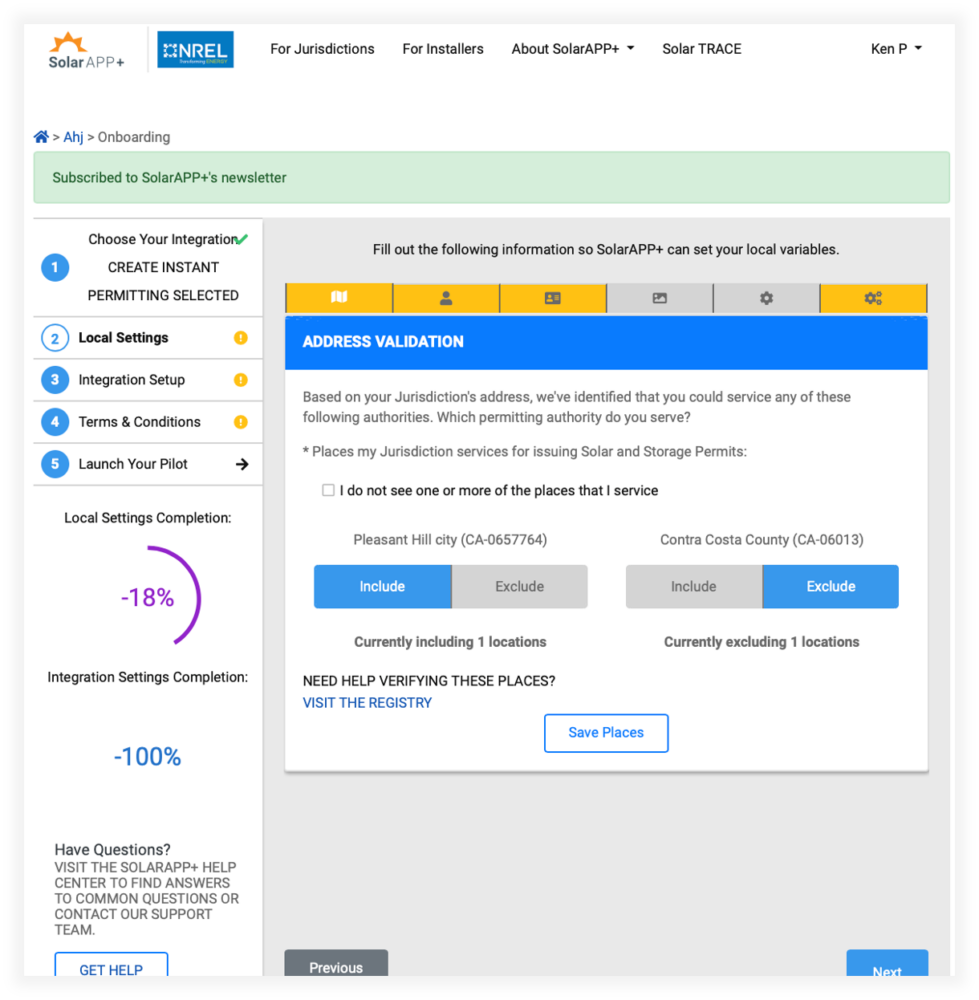|
As climate change poses a growing existential threat, communities around the world are transitioning to green energy to build more resilient, environmentally conscious communities. Solar power, one of the most widely used renewable energies, is critical to mitigating the worst impacts and meeting our climate goals.
Although the motivation is there, implementing solar energy has not been easy. Residents and businesses wishing to use solar energy need special permits, and traditional red tape has led to delays in getting permits - leading to longer deadlines and higher costs. The governance processes of the past are not consistent with our climate goals for the future.
Fortunately, cities and counties across the United States are turning to the latest digital government tools to accelerate their solar permitting processes and meet their community's clean energy goals. In some states, new laws actually require municipalities to adopt these tools. Given their success, it would be wise for other states to follow suit and build digital infrastructure that prioritizes green energy solutions.
Although the motivation is there, implementing solar energy has not been easy. Residents and businesses wishing to use solar energy need special permits, and traditional red tape has led to delays in getting permits - leading to longer deadlines and higher costs. The governance processes of the past are not consistent with our climate goals for the future.
Fortunately, cities and counties across the United States are turning to the latest digital government tools to accelerate their solar permitting processes and meet their community's clean energy goals. In some states, new laws actually require municipalities to adopt these tools. Given their success, it would be wise for other states to follow suit and build digital infrastructure that prioritizes green energy solutions.

SolarAPP+, the solar permitting platform of the US Department of Energy's National Renewable Energy Lab (NREL), has become the leading tool for automated solar permitting for residential rooftop solar and energy storage. The platform integrates with Accela and other government technology construction software solutions to automate plan reviews, permit approvals and project tracking. Permits can be issued the same day so installation can begin immediately.
Since SolarAPP+'s launch two years ago, it has been rolled out in 32 municipalities across the United States to issue 15,000 permits, approve 100,000 kilowatts of energy and save 15,000 hours in regulatory review time.
States across the country recognize their power and promise and rewrite the platform directly into new laws. Recently, California required every city and county to adopt SolarAPP+ or a similar automated permitting tool, and Colorado is now committing nearly $1,000,000 to help local governments adopt the software.
These new laws ensure that the solar energy permitting process is fully digitized, eliminating project delays and unnecessary costs and making access to solar energy for homes more accessible and convenient than ever. Increasing legislative support for SolarAPP+ is prompting municipalities to seek automated solar permitting platforms, integrate them into their government agencies, and drive their climate resilience goals.
Since SolarAPP+'s launch two years ago, it has been rolled out in 32 municipalities across the United States to issue 15,000 permits, approve 100,000 kilowatts of energy and save 15,000 hours in regulatory review time.
States across the country recognize their power and promise and rewrite the platform directly into new laws. Recently, California required every city and county to adopt SolarAPP+ or a similar automated permitting tool, and Colorado is now committing nearly $1,000,000 to help local governments adopt the software.
These new laws ensure that the solar energy permitting process is fully digitized, eliminating project delays and unnecessary costs and making access to solar energy for homes more accessible and convenient than ever. Increasing legislative support for SolarAPP+ is prompting municipalities to seek automated solar permitting platforms, integrate them into their government agencies, and drive their climate resilience goals.
As statewide support grows, new programs designed to incentivize and fund the adoption of solar permits are also emerging, such as California's non-competitive CalAPP grants. These grants help defray the cost of staff time and other resources expended on the already minimal SolarAPP+ implementation. I've heard from government agencies that these grants were some of the easiest funding they've ever applied for. When communities have a strong, stable, and readily available means to integrate automated permitting tools into their resident services, solar adoption increases.

Other states, such as Arizona, offer state tax breaks, a one-time deduction on a resident's or business tax return for installing a solar system, in addition to the 30% federal tax credit. These incentives—plus year-round sunny weather—have helped position Arizona as one of the five states with the highest solar-power generation in the country.
Given the state's solar successes, how new legislation would further increase Arizona's solar energy footprint and existing SolarAPP+ success? As an example, Pima County, an early adopter of SolarAPP+. As of February 2023, a total of 2,754 permits have been issued through the platform, allowing 21,561 kilowatts of energy and saving 2,865 hours in inspections.
The large-scale rollout of automated solar permits ensures country-wide consistency and easy compliance for the installer. Rather than requiring an installer to familiarize themselves with the various permitting processes across city or county lines, the permitting process is the same no matter where they work.
Nationwide integration of SolarAPP+ creates immediate economic benefits and enhances the on-site experience for solar installers. This not only saves solar installers time and money, but also removes the logistical hurdles that have hitherto slowed down the solar market. Statewide automated permitting tools are creating the economic landscape for installers to meet the growing need for clean energy.
Solar energy is the energy of the future. With cost reductions, supportive policies, and large-scale electrification, solar power could account for up to 40% of the country's electricity supply by 2035 and 45% by 2050. To incentivize solar adoption and advance our clean energy goals, states must pave the way for a catwalk that will enable its widespread adoption.
Permission is essential to achieve these goals – a family cannot install solar panels without permission; A company cannot switch to solar energy storage without government approval. The nationwide rollout of automated solar permitting tools like SolarAPP+ will ensure greater consistency and efficiency across jurisdictions, streamlining the process. As municipalities across the United States strive to usher in a new era of renewable energy and advance their environmental goals, digital solar energy permitting infrastructure legislation will be a key element to their success.
Given the state's solar successes, how new legislation would further increase Arizona's solar energy footprint and existing SolarAPP+ success? As an example, Pima County, an early adopter of SolarAPP+. As of February 2023, a total of 2,754 permits have been issued through the platform, allowing 21,561 kilowatts of energy and saving 2,865 hours in inspections.
The large-scale rollout of automated solar permits ensures country-wide consistency and easy compliance for the installer. Rather than requiring an installer to familiarize themselves with the various permitting processes across city or county lines, the permitting process is the same no matter where they work.
Nationwide integration of SolarAPP+ creates immediate economic benefits and enhances the on-site experience for solar installers. This not only saves solar installers time and money, but also removes the logistical hurdles that have hitherto slowed down the solar market. Statewide automated permitting tools are creating the economic landscape for installers to meet the growing need for clean energy.
Solar energy is the energy of the future. With cost reductions, supportive policies, and large-scale electrification, solar power could account for up to 40% of the country's electricity supply by 2035 and 45% by 2050. To incentivize solar adoption and advance our clean energy goals, states must pave the way for a catwalk that will enable its widespread adoption.
Permission is essential to achieve these goals – a family cannot install solar panels without permission; A company cannot switch to solar energy storage without government approval. The nationwide rollout of automated solar permitting tools like SolarAPP+ will ensure greater consistency and efficiency across jurisdictions, streamlining the process. As municipalities across the United States strive to usher in a new era of renewable energy and advance their environmental goals, digital solar energy permitting infrastructure legislation will be a key element to their success.
-
Amber D'Ottavio is Vice President of Manufacturing Management at Accela. With more than 20 years of experience in nonprofit, citizen, and government technology, Amber is passionate about solving public problems with technology, seeking smarter, more sustainable solutions that deliver better outcomes for communities.






